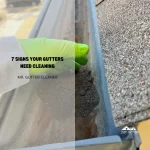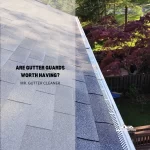Gutter drainage plays a pivotal role in home maintenance, directly impacting a property’s longevity and safety.
Efficient gutter systems prevent water damage to foundations and basements, reduce soil erosion around the home, and mitigate the risk of roof leaks.
With homeowners seeking ways to enhance their gutter drainage, understanding the fundamentals becomes crucial.
This includes recognizing the importance of regular cleaning, the strategic use of gutter guards, correct gutter positioning, and the installation of adequate downspout extensions.
Additionally, integrating advanced solutions like French drains or rain barrels can further optimize water management.
The goal is to equip homeowners with the knowledge to make informed decisions about gutter maintenance, ensuring their homes remain protected against the elements.
By addressing these aspects, homeowners can effectively manage rainwater runoff, thereby safeguarding their property’s structural integrity and enhancing its curb appeal.
What is Gutter Drainage and Why is it Important for Your Home?
Gutter drainage is crucial for home maintenance, channeling rainwater away to protect the structure and landscaping. It prevents foundational damage, soil erosion, and water infiltration into basements, ensuring the home remains safe and dry.
How Does Effective Gutter Drainage Protect Your Home?
Effective gutter drainage safeguards the home’s foundation by directing water away, preventing pooling that can cause cracks and structural issues. It conserves landscaping and prevents erosion, while also protecting the exterior surfaces of your home from water damage and decay.
Table of Contents:
- What is Gutter Drainage and Why is it Important for Your Home?
- What Are the Attributes of an Efficient Gutter System?
- How Can You Improve Gutter Drainage? The 8 Essential Ways
- How to Assess Your Gutter Drainage Needs?
- Implementing Your Gutter Drainage Improvements
- The Long-Term Benefits of Improved Gutter Drainage
- Common Questions About Gutter Drainage
Identifying Common Gutter Drainage Problems
Key gutter drainage problems include blockages from leaves and debris, incorrect slope or installation, inadequate downspout capacity, and general wear and tear. Early identification and resolution of these issues are vital for the gutter system to function effectively, thereby protecting the home from potential water damage.
What Are the Attributes of an Efficient Gutter System?
An efficient gutter system effectively channels water away from a home, safeguarding the structure against water damage. Attributes of such a system include proper installation, adequate capacity, and durability. These characteristics ensure that gutters perform reliably under various weather conditions, protecting the home from potential water-related issues.
Key Components of a Gutter System
The key components of a gutter system encompass gutters, downspouts, gutter guards, and drainage outlets. Gutters collect rainwater from the roof, which flows through downspouts away from the home’s foundation. Gutter guards prevent debris accumulation, ensuring water flows freely. Properly configured, these components work together to maintain a home’s structural integrity and prevent water damage.
Material and Design Choices for Better Drainage
Material and design play crucial roles in gutter system efficiency. Materials like aluminum, steel, or PVC offer durability and longevity, while the design should ensure optimal water flow and ease of maintenance. Seamless gutters, for example, reduce leaks. The choice of material and design directly impacts the system’s effectiveness in preventing water damage to the home.
How Can You Improve Gutter Drainage? The 8 Essential Ways
Improving gutter drainage is key to maintaining your home’s structural integrity and preventing water damage. There are several strategies homeowners can employ to enhance their gutter system’s effectiveness.
Regular Cleaning and Maintenance: The First Step to Better Drainage
Regular cleaning and maintenance of gutters remove leaves, debris, and obstructions, ensuring water can flow freely.
This preventive measure is crucial for avoiding clogs that can lead to water overflow and damage.
Installing Gutter Guards: Are They Effective?
Gutter guards can significantly reduce the amount of debris entering your gutters, decreasing the need for frequent cleaning.
They are an effective solution for maintaining clear water pathways but require correct installation and periodic checking.
Proper Gutter Positioning and Slope Adjustment
Correct gutter positioning and slope ensure that water is efficiently directed towards downspouts, without pooling. This involves adjusting the gutters’ angle to facilitate optimal water flow, a critical factor for efficient drainage.
Downspout Extensions and Their Role in Enhancing Drainage
Downspout extensions play a vital role in directing water away from the foundation of your home. They can be added to existing downspouts to improve water diversion, protecting the home’s foundation and landscaping.
The Importance of Correct Downspout Sizing
Ensuring downspouts are correctly sized for your roof’s square footage is essential for handling the volume of water during heavy rains. Larger roofs may require wider or additional downspouts to manage water flow effectively.
Rain Barrels for Water Management: Pros and Cons
Rain barrels can be used to collect and store rainwater from gutters, reducing runoff and providing a source of water for gardening. While beneficial for water conservation, they must be properly integrated into your gutter system to avoid overflow issues.
Incorporating French Drains into Your Gutter System
French drains can enhance gutter drainage by further directing water away from your home’s foundation. Installed underground, they help manage water distribution in your yard, preventing saturation near the home.
Professional Gutter Inspection and Upgrade Recommendations
Seeking professional advice for gutter system inspections and upgrades can identify potential issues and solutions for improved drainage. Experts can recommend adjustments and enhancements tailored to your home’s specific needs.
How to Assess Your Gutter Drainage Needs?
Assessing your gutter drainage needs is critical for maintaining your home’s health and preventing water damage. This process involves evaluating the current state of your gutter system, identifying potential issues, and determining whether upgrades or maintenance are necessary.
When to Know It’s Time for a Gutter Upgrade
Knowing when to upgrade your gutters is essential for proactive home maintenance. Signs include frequent clogs, water spillover during rain, visible sagging or separation from the house, rust or damage, and water marks or damage on your home’s exterior. These indicators suggest your gutter system may no longer be effectively protecting your home from water damage.
DIY Gutter Maintenance Tips vs. Professional Services
DIY gutter maintenance can be a cost-effective way to manage your gutter drainage needs, involving regular cleaning, inspecting for damage, and ensuring downspouts are clear and directing water appropriately. However, professional services offer expertise in comprehensive inspections, repairs, and upgrades, which can be particularly beneficial for complex issues or installations. Balancing DIY efforts with professional assistance ensures your gutter system operates efficiently, protecting your home from the adverse effects of improper drainage.
Implementing Your Gutter Drainage Improvements
Successfully implementing gutter drainage improvements can significantly enhance your home’s resilience against water damage. This section guides homeowners through the practical steps to upgrade their gutter system effectively.
Step-by-Step Guide to Cleaning Your Gutters
Cleaning your gutters is essential for maintaining optimal drainage. Start by removing debris and leaves from the gutter channels, then flush them with water to check for flow and identify any leaks.
Regular cleaning, ideally twice a year, prevents blockages and ensures water can flow freely.
Installing Downspout Extensions Yourself: A How-To
Downspout extensions are critical for directing water away from your home’s foundation. To install, measure the distance needed to direct water effectively, choose the appropriate extension type, and attach it securely to the existing downspout.
Ensuring proper slope away from the foundation will optimize water diversion.
Selecting the Right Gutter Guards for Your Home
Choosing the right gutter guards involves considering the types of debris commonly found in your gutters and the compatibility with your existing gutter system. Mesh, screen, foam, and surface tension guards offer different levels of protection and ease of maintenance. Consult with a professional to select the best option for your home’s specific needs, taking into account local foliage and weather patterns.
The Long-Term Benefits of Improved Gutter Drainage
Improved gutter drainage offers significant long-term benefits for homeowners, extending beyond mere water management to enhance the overall wellbeing of their property. These advantages underscore the importance of maintaining an effective gutter system.
Preventing Water Damage and Foundation Issues
Enhanced gutter drainage effectively prevents water from pooling around the home’s foundation, a critical factor in mitigating the risk of water damage and foundation issues. By directing water away efficiently, it safeguards the structural integrity of the home, reducing the likelihood of costly repairs associated with water infiltration and foundation weakening over time.
Enhancing the Lifespan of Your Gutter System
Regular maintenance and improvements to gutter drainage not only optimize performance but also extend the lifespan of the gutter system itself. By preventing clogs, ensuring proper flow, and mitigating corrosion and wear, homeowners can enjoy a more durable and less maintenance-intensive system. This results in lower replacement costs and less frequent need for repairs, contributing to overall home maintenance savings.
Common Questions About Gutter Drainage
Addressing common questions about gutter drainage helps homeowners understand how to maintain and improve their gutter systems effectively. This section aims to clarify frequent concerns, providing insights into gutter maintenance and optimization.
Can Better Gutter Drainage Save Money in the Long Run?
Yes, improving gutter drainage can lead to significant long-term savings. By preventing water damage to the foundation, walls, and landscaping, homeowners can avoid costly repairs. Additionally, efficient gutters reduce the need for frequent cleanings and repairs, further saving on maintenance costs.
How Often Should You Inspect Your Gutter System?
Homeowners should inspect their gutter system at least twice a year, typically in the spring and fall, to ensure it’s free of debris and functioning correctly. Inspections should also follow severe weather events to check for damage or blockages. Regular inspections help identify potential issues early, preventing minor problems from escalating into more significant, expensive repairs.


